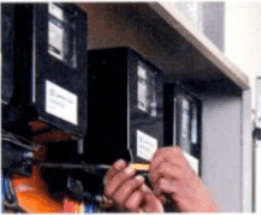India is the sixth largest power consumer in the world and the third largest in Asia. The country’s installed capacity (as of March 2011) stood at 173.6 GW. This corresponds to energy generation of 800 billion units. However. despite such a large scale of energy generation, the country faces peak and total electricity deficits of 10.3 per cent and 8 7 per cent respectively. Even today, more than 50 per cent of households are without reliable electricity supply. One of the prime reasons for the prevailing electricity deficit is the level of high aggregate technical and commercial (AT&C) losses The average AT&C loss in the country stood at 34 per cent with several utilities recording losses of over 50 per cent This corresponds to financial losses of a whopping Rs 3 8 trillion .
Of the total AT&C losses recorded by utilities. about 35 per cent is due to metering inefficiency while the rest is due to theft or pilferage of electnctty Smart metering solutions provide an effective way to reduce ATISC losses arising due to metering inefficiencies.
 A smart meter is an advanced electrical metering device that records electricity consortia at regular defined intervals. communicates with the utility’s servers on a real-time basis. provides remote correct am disconnect facilities. and auto-dis-connection in case of load detection and captures significant events power outage notification. demand-side management and poor quality monitoring Smart meters are equipped with advanced metering infrastructure (AM) features like local area network, home area network automated switching. demand response as well as theft monitoring and control The most important feature of a smart meter is a two-nay interface between the meter and the utility. This ensures the continuous monitoring and gives alerts in case the meter is subjected to any tampering.
A smart meter is an advanced electrical metering device that records electricity consortia at regular defined intervals. communicates with the utility’s servers on a real-time basis. provides remote correct am disconnect facilities. and auto-dis-connection in case of load detection and captures significant events power outage notification. demand-side management and poor quality monitoring Smart meters are equipped with advanced metering infrastructure (AM) features like local area network, home area network automated switching. demand response as well as theft monitoring and control The most important feature of a smart meter is a two-nay interface between the meter and the utility. This ensures the continuous monitoring and gives alerts in case the meter is subjected to any tampering.
Since conventional meters are installed at the consumer’s premises. they can easily be tampered with. As a result, the actual power consumption is never recorded and the actual cost of supply never recovered by the utility. Moreover, the average collection period from defaulters is 60-80 days, as supply needs to be manually disconnected at the household.
North Delhi Power Limited (WRIT one of the private distribution utilities in Delhi has installed sophisticated meters with features will as
Though NDPL has not implemented the AMI solution. it has initiated the process tot executing a smart feeder pilot project with AMI features in association with IBM The project is expected to be implemented within 15 months finalisation. Based on the outcome of the full deployment of smart feeders would be implemented within five years. NDPL intends to Implement this project across all its 700 feeders In Delhi Along with the pilot project. the company also intends to execute an exercise for the assessment of smart grid maturity. its business case and an implementation road map. NDPL already has some projects in place for smart grid alignment like AMR, SCADA, GIS. grid substation automation system, distribution managed system. distribution automation. and outage management system.
Smart meters, which are key to the proposed smart grid. have not been implemented in India so far. There are technical challenges with smart meter technologies in India with respect to tamper characteristics and installation procedures. The standardization of smart meter specification for utility-scale use has not been implemented. Moreover, smart meters have yet been approved by the regulatory authorities. It must be noted that AMI is an infrastructure or a foundation over which a smart grid can be created. Metering solution providers are not yet geared to supply smart grid solutions to the Indian market, as they are equipped nether with products nor skilled resources. There has to be a business case to justify the in in a smart grid.
Worldwide. such projects have been implemented using both GPRS and power line communication (PLC) technologies. PLC implementation requires high quality power cable infrastructure which is yet to be tested in India while GPRS may require enhanced provisioning and service quality from service providers Thus, an articulated technology plan is required to implement smart metering solutions and go ahead with the smart grid plan.
R K. Singh. Head. Special Consumer
Group, NDPL, and Galosh Maine, Deputy
General Manager, Secure Australia